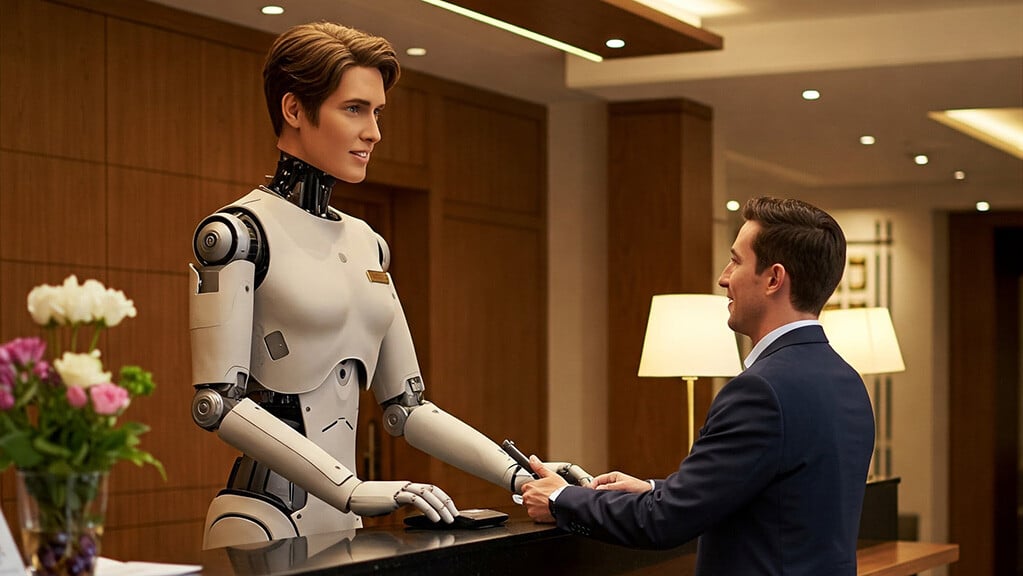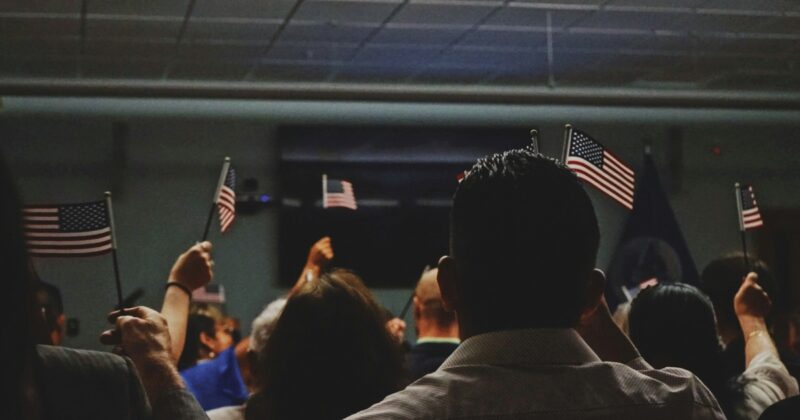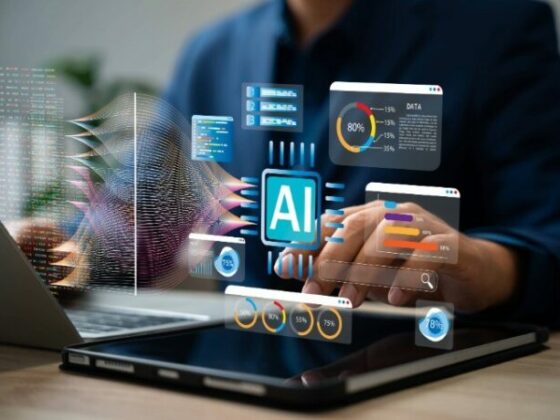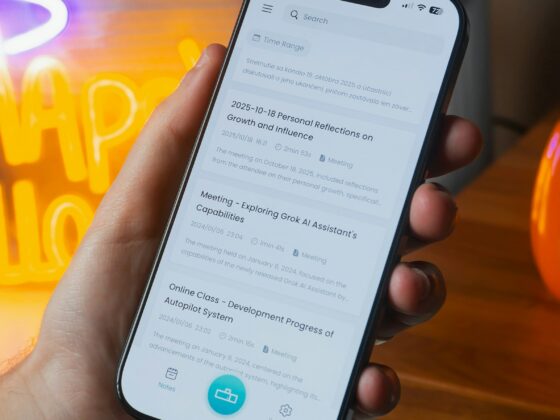
We’ve all heard it: “Hospitality is a people business.” It evokes images of warm welcomes and personal connections. But let’s be honest: How often does reality, especially at the front desk, match this ideal? Faced with stressed staff, inconsistent service, and a revolving door of employees, it may be time to ask a controversial question: Could a robot provide a better, more consistent, and even functionally empathetic check-in experience? Before dismissing the idea, consider the front desk’s current state and the potential technology offers.
But does this focus on the ideal fully account for the often-flawed reality many guests encounter daily? This post takes a different, perhaps provocative, stance. I argue that the challenges inherent in the current human-staffed front desk model – inconsistency, stress, lack of personalization, potential bias – create an opening for well-programmed robots to offer a surprisingly more effective and consistently positive ‘guest-centric’ welcome. Let’s delve into why the status quo often falls short.
The Human Problem: Why the Current Front Desk Often Fails Us
The idea of the friendly, knowledgeable, empowered front desk agent often clashes with reality. Let’s break down the issues:
- The Revolving Door: Front desk turnover can hover around 100% annually in the US hotel industry. This means the person checking you in today is likely gone tomorrow. Forget building rapport or expecting experienced service – consistency is nearly impossible.
- Knowledge Gaps: High turnover often goes hand in hand with inadequate training. Staff may not know hotel procedures, local information, or how to handle basic requests efficiently.
- Lack of Empowerment: How often have you heard “I need to get my manager”? Front desk staff are frequently not allowed to make decisions, leading to delays and guest frustration when simple issues could be resolved quickly.
- Visible Stress: The front desk is a high-pressure job. Staff juggle check-ins, check-outs, phone calls, and guest complaints. This stress inevitably spills over, impacting their mood and the quality of their interactions. Is a forced smile from a stressed employee genuinely welcoming?
- “Who Are You Again?”: In today’s data-rich world, it’s baffling how often hotels fail basic personalization. Staff (and usually their systems) frequently have no idea if you’re a first-time guest or a loyal customer who’s stayed dozens of times. This lack of recognition feels impersonal, the opposite of hospitable.
Enter the Robot: Consistency, Knowledge, and Functional Empathy
Now, imagine how a technologically advanced humanoid robot will perform the front desk agent job and enhance the guest experience:
- Flawless Recognition & Personalization (with Facial Recognition & Multilingual Capability): Imagine walking up to the desk. The system identifies and greets you by name before you speak by using secure facial recognition (linked to your profile and reservation, perhaps with prior opt-in for enhanced privacy and convenience). It instantly accesses your complete stay history, preferences (room type, floor preference, past requests), and loyalty status. “Welcome back, Ms. Smith! It’s wonderful to see you again. We see you prefer a high-floor room away from the elevator, and we have one ready that meets your preferences.” And, crucially, the interaction happens seamlessly in your preferred language, whether it’s English, Japanese, French, Spanish, Mandarin, or virtually any other, instantly eliminating the communication barriers sometimes encountered even in international hotels. This seamless, instant recognition, personalized recall of details, and effortless communication in your language demonstrates the value and care far beyond what’s typically possible with human staff rotation – a powerful form of functional empathy.
- Consistent & Calm Service 24/7 (with Concierge Capabilities): Robots don’t have bad days. They don’t get stressed, tired, or impatient. The service protocol is executed perfectly every time, with the same polite tone and efficiency, regardless of the hour or how busy the “lobby” is. Need more than just check-in? Imagine the robot seamlessly handling your requests: instantly arranging airport transportation, securing a dinner reservation at that popular local restaurant by interfacing directly with booking systems, or purchasing tickets for a museum, event, or local attraction – all handled smoothly and efficiently within moments, without needing to wait for a busy staff member to make calls or consult multiple sources.
- Omniscient Knowledge (with Dynamic Room Management): Forget “I don’t know” or the hesitant “Let me check with housekeeping/my manager.” A robot connected to all hotel systems has instant access to everything: hotel information, policies, local events, restaurant menus, and real-time operational data. Would you like an early check-in, or would you need a late check-out? Instead of lengthy waits or vague answers, the system can instantly analyze the live room inventory, cross-reference housekeeping schedules, and check incoming guest arrival times. In many cases, it could dynamically rearrange room assignments and cleaning priorities on the fly to accommodate your request whenever possible, providing immediate confirmation. This level of instant, complex decision-making and dynamic inventory management is something human staff often struggle to perform quickly or effectively.
- Reliability & Accuracy (Expanded Capabilities): Furthermore, consider the robot’s potential beyond mere transactions, grounded in its inherent reliability. Research shows that AI can outperform human doctors in specific diagnostic tasks. The hotel robot can handle complex check-in procedures, billing adjustments, and detailed information requests with far fewer errors than an overwhelmed or undertrained human might make. But its capabilities could extend dramatically further, depending on its design:
- Integrated Health Assistance: While not replacing human doctors, imagine a system with advanced AI. It could potentially analyze symptoms described by a guest (or even basic visual signs via sensors) against a medical database to offer preliminary standardized first-aid guidance based on established protocols or facilitate an immediate connection to emergency services or a licensed telehealth professional in critical situations – potentially acting faster and more calmly than a flustered human staff member.
- Physical Assistance: A sufficiently advanced physical robot could offer practical help. Its design could incorporate significant strength, allowing it to directly assist guests with their luggage, eliminating the wait for a separate porter.
- Enhanced Security: Robots can be equipped with sophisticated sensors (cameras, thermal, audio). It could function as a vigilant front-line security presence, constantly monitoring the lobby environment, cross-referencing guest data, identifying potential security threats or anomalies (like unauthorized access attempts), and instantly alerting dedicated human security or emergency services with precise information.
- Avoiding Negative Interactions (and Human Bias): Research on attitudes towards self-driving cars shows some people, particularly women, prefer dealing with predictable technology over a potentially harmful or uncomfortable interaction with a human driver. Could the same apply at the front desk? A neutral, efficient robot avoids the potential downsides of human interaction – there’s no risk of encountering rudeness, impatience, inappropriate comments, or just someone having a visibly lousy day. Furthermore, a robot possesses no inherent biases based on race, gender, age, appearance, disability, or any other personal characteristic; its programming ensures it treats every individual genuinely and equally as a valued guest according to defined service standards. This guarantees fairness and impartiality that humans, consciously or unconsciously, may sometimes fail to achieve, ensuring every guest feels equally welcome and respected.
A Generational Shift in Preference?
Younger generations are digital natives, comfortable with and often preferring tech-based interactions for efficiency and control. They value seamless, fast, and reliable service. The potential awkwardness or inefficiency of some human interactions may make a well-designed robotic interface actively preferable for this growing demographic, which will soon become the largest in the US and worldwide.
Conclusion: Redefining the Welcome
For the often transactional and frequently flawed reality of the front desk, perhaps technology offers a more reliable, consistent, and ultimately more guest-centric solution. When a robot remembers you, handles your needs efficiently in any language, operates without bias, never makes you feel like an inconvenience, and provides a consistently smooth experience, isn’t that a powerful form of hospitality itself? The most “human” thing a hotel can do at the front desk is to ensure a flawless welcome, even if it’s delivered by a robot using tech-based interactions. Guests often prefer these interactions for their efficiency and control. They value seamless, fast, and reliable service. Some human interactions’ potential awkwardness or inefficiency might make a well-designed robotic interface preferable. Leaving the guest with just one final question for their perfect robotic host: “So, where can I find some humans for a beer?”








